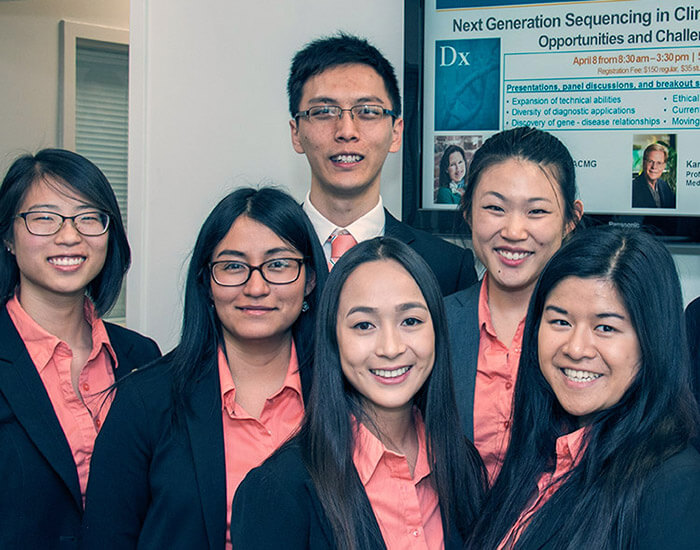Spectrum Laboratories needed to test a new product. Keck Graduate Institute (KGI) had the appropriate space, as well as students ready to help a company solve a practical problem. It was the perfect scenario for a Team Master’s Project (TMP) pairing the two.
Michael Bransby, the director of process technology for Spectrum Laboratories, served as the company’s TMP sponsor along with application scientist Philip Yuen. “We were trying to launch a new product and didn’t have our own culture lab,” Bransby explains. “We needed the students to do the research and run the data for a new type of filter for perfusion that added a depth component to the membrane.”
The student team started in Fall 2016 by familiarizing themselves with the technology, after which they conducted the experiments and subsequent analysis. “We provided the instruments and some guidance, but the students did all the work,” Yuen notes. “They were awesome. They had a really good attitude and asked all the right questions.”
Not that they had an easy task. Experiments needed to run for days at a time, requiring constant attention. Jasmine Tat, MEng ’18, joined the student team early in 2017 to help fulfill her long-time goal of not only pursuing research, but also applying it to therapeutics. “The experience is very laborious,” she says of the TMP, “and you do it while also doing all the work for class. A few days of running a bioreactor is like having a baby—you’re always on duty. But it’s all very valuable. What I learned most was how to apply what I learned in classes to industry.”
Tat and the other team members have also been able to see the fruits of their work. Yuen presented their findings, titled “A Novel Perfusion Filter and System for Scalable Continuous Manufacturing,” at bioprocessing industry meetings. Spectrum Laboratories has since posted this information on its website and recently brought the Tangential Flow Depth Filter to market.
“This is cutting-edge technology, and they were able to overcome hurdles and really figure it out,” says Bransby. “I think this will really benefit them in the future.”
Yuen elaborates, “They got experience working with a company—the kind of experience I didn’t have as a graduate student. There’s a big push in perfusion technology right now, and they’ll go into the workforce with experience that’s sought after by industry.”
Tat is already recognizing the impact of the TMP. She and several others who worked with Spectrum Laboratories were hired as interns this summer at Amgen. “We all had a skillset and way of thinking that gave us an edge over the competition. The TMP really made that happen and trained me for my summer experience at Amgen.”
Bransby and Yuen found the TMP equally beneficial—so much so that Spectrum Laboratories has signed on for another one this year. Bransby says of the new project, “We’re trying to test new types of membranes. The students know how to do this now, so they can start right away. It’s great that they know our products and understand how they work.”
Tat is also back to work on the new Spectrum Laboratories TMP. This time, she’s heading the student team as the project manager. “I wanted more management and leadership experience,” she explains. “It’s a lot of hard work, but it will be really rewarding.”
Now Tat is training first-year TMP students as well as running experiments. “I want them to not just do the work, but also grow in the technical and professional aspects. I’m trying to think about both what the project needs and what they need, to understand how they work best and place them in the right roles. Learning about managing people will help determine where I go in industry. I still have a lot to learn technically and may eventually go on to a PhD, but starting in a leadership role now will help me become a leader later.”
